News
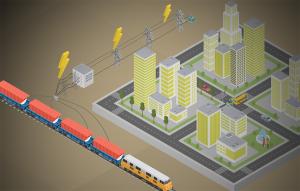
June 12, 2023
The U.S. electric grid faces simultaneous, evolving pressures. Demand for power from the grid is increasing as people adopt electric cars and building energy is transitioned from gas to electricity. At the same time, climate change is driving more extreme weather. Events like the 2020 heat wave that led to rolling blackouts in California are relatively infrequent, but they are happening more often...
Read more

May 10, 2023
After the Justice40 (J40) Initiative was established in 2021 by President Biden with the objective that 40% of benefits from certain federal investments go to disadvantaged communities, five scientists at the U.S. Department of Energy’s (DOE’s) Lawrence Berkeley National Laboratory (Berkeley Lab) played a key role in mapping out how to achieve this goal in federal programs that focus on...
Read more
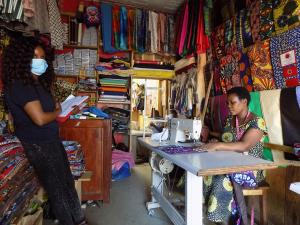
April 26, 2023
Women who run small businesses in Uganda can build energy efficiency into their business plans thanks to a new project led by Lawrence Berkeley National Laboratory (Berkeley Lab) and the U.S. Agency for International Development (USAID), in partnership with Clean Energy Enthusiasts (CEE), an energy advisory company based in Uganda. According to the World Bank, one in three of all businesses in...
Read more

April 6, 2023
Levels of planet-warming carbon dioxide in the air continue to rise. Cutting emissions by moving away from fossil fuels is a priority – but so is removing carbon that’s already been emitted. Of the many emerging technologies on the table, which ones will be most effective, and where? What about costs? What kinds of investments will have the most impact? Scientists at the Department of...
Read more
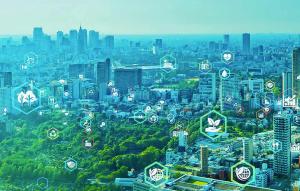
March 30, 2023
Limiting global warming to 1.5 degrees Celsius above pre-industrial levels will require severely cutting greenhouse gas emissions by nearly 50% by 2030. Doing so calls for the immediate, large-scale adoption of energy efficiency, renewable energy, electrified transportation, high-performance batteries, low-carbon grids, and carbon capture and storage technologies across all sectors globally. This...
Read more
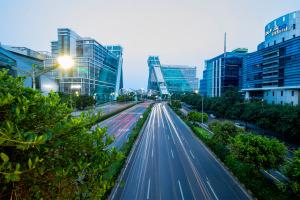
March 15, 2023
India can achieve its vision of energy independence by 2047, according to a new study titled Pathways to Atmanirbhar Bharat (which translates to “self-reliant India”), released by the U.S. Department of Energy’s Lawrence Berkeley National Laboratory (Berkeley Lab). Examining India’s three most energy intensive sectors (power, transport, and industry), the study determined that achieving...
Read more

March 10, 2023
Why isn't more plastic actually recyclable? Why don’t compostable forks actually compost? And when are we going to solve our waste problems? A recent episode of A Day in the Half-Life, a podcast about science from Lawrence Berkeley National Laboratory (Berkeley Lab), explores these and other questions related to plastics and recycling. There are reasons for optimism. Three Berkeley Lab...
Read more
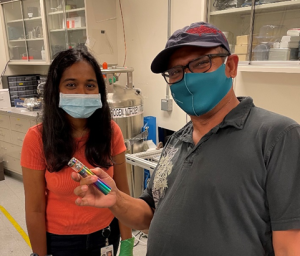
February 23, 2023
In a first-of-its-kind study, scientists at the Department of Energy’s Lawrence Berkeley National Laboratory (Berkeley Lab) have used specialized X-ray spectroscopy technology to analyze in exquisite detail the acid-base equilibria of additive-enhanced nicotine in simulated vaping aerosols. Their findings provide a foundation for better public health understanding of how recent e-cigarette...
Read more

December 5, 2022
A building's indoor air quality (IAQ) plays a key role in the health, comfort, and performance of the people who spend countless hours in offices, homes, and other indoor spaces. From mold to cooking smoke to airborne viruses such as Covid-19 and the common cold, factors both seen and unseen come into play when determining IAQ. Experts at a recent conference hosted by the Johns Hopkins Center for...
Read more
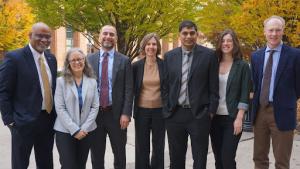
December 5, 2022
From single-family and multifamily housing to commercial buildings and university campuses, groups of buildings offer untapped potential to boost energy efficiency and reduce greenhouse gas emissions. Through its Connected Communities program, the U.S. Department of Energy (DOE) recently launched nine demonstration projects across the country to explore this potential. DOE’s Lawrence Berkeley...
Read more

December 1, 2022
By 2033, more than 1 billion laptops, cellphones, and other electronic devices could be entering the U.S. waste stream each year. That’s according to a new study in Nature Sustainability that projects a dramatic increase in the amount and complexity of U.S. waste electronics in the decade ahead. If not properly recycled, this influx represents a growing cause for environmental concern as it...
Read more

November 28, 2022
Lawrence Berkeley National Laboratory (Berkeley Lab) research scientist Hanna Breunig was named co-director of the Hydrogen Materials Advanced Research Consortium (HyMARC). Breunig serves as Deputy-Head of the Sustainable Energy and Environmental Systems Department within the Energy Analysis and Environmental Impacts (EAEI) Division of Berkeley Lab. HyMARC was formed to address the scientific gaps...
Read more

November 22, 2022
Diesel-fueled freight trucks play an outsized role in producing India’s total greenhouse gas and air pollution emissions. While the country has promoted policies to transition to electric vehicles for public transportation buses and cars, batteries that can power such large trucks have been too heavy and expensive to make their electrification possible. A new study from the Department of...
Read more
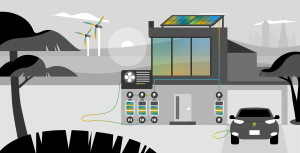
November 22, 2022
This article was adapted from a release developed by the National Renewable Energy Laboratory and was initially published at the Berkeley Lab News Center. Stor4Build is a new consortium on energy storage for buildings that will accelerate the growth, optimization, and deployment of storage technologies. The consortium will be co-led by the U.S. Department of Energy’s (DOE’s) Lawrence Berkeley...
Read more
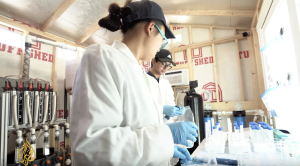
October 25, 2022
A recent segment on Al Jazeera English featured field research on arsenic removal initiated at Lawrence Berkeley National Laboratory (Berkeley Lab). Led by Ashok Gadgil, a physicist and senior faculty scientist at Berkeley Lab’s Energy Technologies Area, scientists and engineers are testing a filtration system in rural California that can remove dangerous levels of arsenic from groundwater at...
Read more
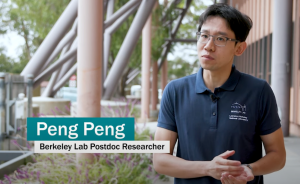
September 26, 2022
Chemical engineer Peng Peng is helping develop a 100% renewable energy grid by investigating new materials for storing hydrogen gas, which can be used like a battery to stash power generated from solar and wind farms. Watch the video to learn how Peng uses computer models to study how lab-scale material prototypes would perform at the industrial scale, and how much they would cost – accelerating...
Read more
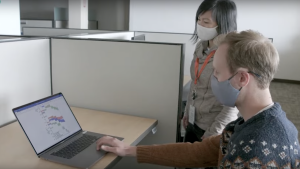
September 22, 2022
Berkeley Lab researchers reviewed evidence on using indoor engineering controls to reduce transmission risk Watch the related video on our youtube channel: youtu.be/fgNb6B9NZ2w Along with vaccines, masks, and testing, indoor air hygiene and building engineering controls will be key to slowing the spread of airborne, highly infectious variants of COVID-19. In a recent review in the journal Indoor...
Read more
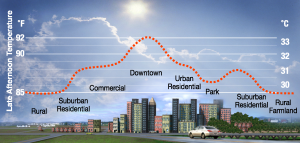
August 24, 2022
By the middle of this century, temperatures in some California cities are expected to be in the triple digits for a third of the year. That’s dangerously hot. Heat already kills more people each year than any other weather-related disaster, including hurricanes, floods, or winter storms, and as the mercury rises the toll is expected to keep climbing. Researchers and scientists from across the...
Read more

August 23, 2022
Multiple innovative technologies developed in the Energy Technologies Area of the U.S. Department of Energy’s (DOE) Lawrence Berkeley National Laboratory (Berkeley Lab) have been honored with a 2022 R&D 100 Award. The award, presented by R&D Magazine and selected by an independent panel of judges, recognizes the year’s 100 most innovative and disruptive technology products from...
Read more
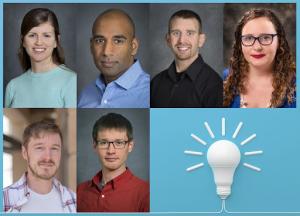
August 19, 2022
Consumers will save nearly $3 billion per year on utility bills and carbon emissions will be cut drastically over the next 30 years, thanks to two new rules for light bulbs recently adopted by the U.S. Department of Energy (DOE). The implementation of these new standards for energy efficiency is a thrilling achievement for the DOE Appliance Standards Program, supported by the small yet mighty...
Read more
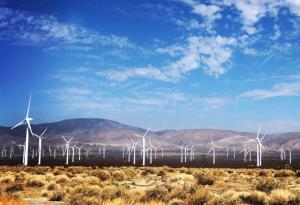
August 16, 2022
Wind energy continues to see strong growth, solid performance, and attractive prices in the U.S., according to a report released by the U.S. Department of Energy (DOE) and prepared by Lawrence Berkeley National Laboratory (Berkeley Lab). With levelized costs of just over $30 per megawatt-hour (MWh) for newly built projects, the cost of wind is well below its grid-system, health, and climate...
Read more

August 15, 2022
Some smells seem to seep into everything they touch. Tobacco smoke is one of the worst offenders. Thirdhand smoke refers to residual nicotine and other hazardous chemicals that contaminate the indoor environment after smoking. Think of the lingering smell you’ve probably encountered when handling the clothes of a person who smokes a pack a day, or when checking into a tidy but cigarette-friendly...
Read more
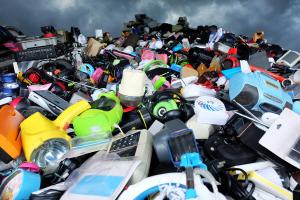
July 29, 2022
Scientists have designed a new material system to overcome one of the biggest challenges in recycling consumer products: mixed-plastic recycling. Their achievement will help enable a much broader range of fully recyclable plastic products and brings into reach an efficient circular economy for durable goods like automobiles. We generate staggering quantities of plastic and plastic-containing...
Read more

July 27, 2022
Berkeley Lab has initiated a national public-private partnership to update and upgrade the Interruption Cost Estimate (ICE) Calculator—a publicly-available, online tool—which estimates the economic consequences of power interruptions. Information on the costs that customers experience when the lights go out is an important consideration for the planning and prioritization of improvements to...
Read more

July 20, 2022
Converting petroleum into fuels involves crude chemistry first invented by humans in the 1800s. Meanwhile, bacteria have been producing carbon-based energy molecules for billions of years. Which do you think is better at the job? Well aware of the advantages biology has to offer, a group of biofuel experts led by Lawrence Berkeley National Laboratory (Berkeley Lab) took inspiration from an...
Read more